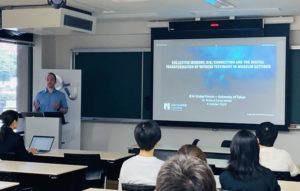2023.Oct.20
REPORTSReport on Dr. Richard Carter-White’s Lecture Entitled “Collective Memory, Dis/connection and the Digital Transformation of Witness Testimony in Museum Settings”
Alyssa Castillo Yap (Graduate Student Member, B’AI Global Forum)
・Date: Monday, October 4, 2023, 15:00-16:30 (JST)
・Venue: Online & On-site (Institute for AI and Beyond, The University of Tokyo, Asano Campus) Hybrid
・Language: English
・Speaker: Dr. Richard Carter-White (Senior Lecturer of Human Geography at the School of Social Sciences, Macquarie University)
・Moderator: Ai Hisano (Associate Professor, Interfaculty Initiative in Information Studies / Graduate School of Interdisciplinary Information Studies, the University of Tokyo)
・Organizer: B’AI Global Forum, Institute for AI and Beyond, The University of Tokyo
・Supported by: The Institute for AI and Beyond, The University of Tokyo
(Click here for details on the event)

The talk on “Collective Memory, Dis/connection and the Digital Transformation of Witness Testimony in Museum Settings” is the second time that Dr Richard Carter-White shares, in a hybrid talk with the B’AI Global Forum, his ongoing research on the potential of digital platforms to engage new publics. In December of 2022, he talked about the use of VR for learning and teaching geography ( https://baiforum.jp/en/report/re072/ ) and this time around, he continues his exploration on the digitalization of difficult heritage.
Dr. Carter-White began his talk by describing the importance of and values surrounding multimedia representations of witness testimonies in museums. Beginning with the story of his recent visit to the Hiroshima Memorial Peace Museum, Dr. Carter-White observed the varied formats and perspectives used in representations of testimonies, and their “humanizing, personalizing, and emotive” roles for “imaginatively connecting with” the visitor. The lecture foregrounded the case of USC Shoah Foundation’s AI-facilitated project which enables the testimonies of Holocaust survivors to be communicated to visitors, via holographic image of pre-recorded witness interview responses. These videos serve as answers to “prompts” which are retrieved through artificial intelligence to answer visitors’ questions. Dr. Carter-White referred to this “witnessing machine” as potentially problematic, because it lacks transparency about how the “original” interviews were conducted, how emotion could be lost over the medium of communication, and the one-sidedness of the experience.
In summary, Dr. Carter-White suggested three crucial dimensions that are negotiated in the emergent use of “witnessing machines” in museum representations of testimony: communality and ritual, spontaneity and reflection, and finally, identification and distance.
One of the most striking arguments emerging from the lecture included the differentiation Dr. Carter-White made between truth and truthfulness in “bearing (with) witness testimony” during a time where digital information is in unprecedented abundance. Some may question that testimonies hold no credibility, but Dr. Carter-White argued that errors in memory can themselves also be a form of testimony. In such a way, visitors are posited by Dr. Carter-White as “respons-able audiences” and citing Aragoni and Galagi (2012), he advocates for a shift to monologic to dialogic practices in museums. He then discussed witness testimonies specifically foregrounding themes of authenticity, credibility, simplicity and trustworthiness. He explained that these four themes empower testimonies because of their closeness to us, in contrast with AI technologies today which have no aura of authenticity, credibility, simplicity, or trustworthiness due to their digital nature (as opposed to analogue or traditional).
The lecture invited many questions from both online and offline audiences, reflecting on the topic of digital witness testimonies of difficult heritage from different disciplines and backgrounds. While we hear about ongoing conflicts around the world through screens on the train, our portable computers, or our handheld smartphones, Dr. Carter-White’s research echoes an imperative towards cultivating sensitivity and literacy for archiving difficult histories. His research as presented in the lecture surely connects us not only in retrospective accounts of war, suffering and trauma, but also in ongoing struggles across the globe that we have grown only to see, hear and talk about passively in daily practice.